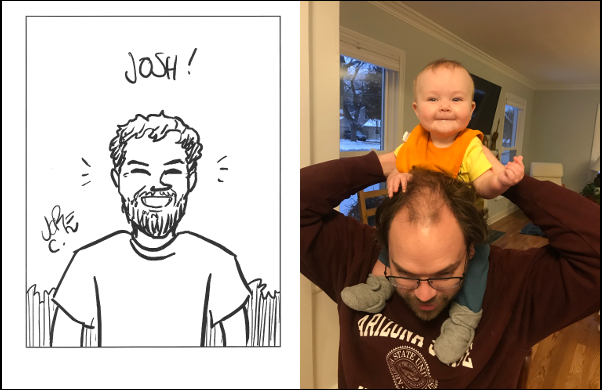Josh Vermaas - BMB Community Profile

Position: Assistant Professor
Why did you become a scientist?
When I was deciding on a college major, I initially wanted to be an aerospace engineer, designing really cool things based on cutting edge technology. However, on a family trip driving around the Dakotas with the Arizona State University course catalog in tow, I realized that I could get three degrees in different branches of science in the same time it would take to become an engineer. The fundamental reason for this is that science is interconnected. Being a physics major meant that you also had to take chemistry classes, which required math classes, which you could apply to physics. The connections between seemingly different topics were really cool to me, and encouraged me to learn more about how different pieces fit together. Biology is great for this, since all of these complex structures we see in the world around us are put together by nature iteratively solving for an acceptable solution constrained by chemistry and physics principles.
What is your favorite part about your job?
The “Huh, that is weird” moments that make you dig deeper into what is going on.
How have you overcome obstacles to get where you are?
My undergraduate research experiences were… uneven at best. I think I wrote the most successful failed experiment lab reports ever, since the only organic chemistry experiment that worked was when we made nylon. Everything else failed miserably. I learned through independent study experiences that this is because I am not very handy. I constantly broke equipment in a wetlab, and was somewhat off-putting.
What opportunities or positive experiences helped you get to where you are?
However, these undergraduate experiences also guided me towards computational science. I had a bit of a programming background from messing around in high school, and after my failures in a wetlab, other mentors stepped forward. I am supremely grateful that they were undeterred by the mistakes I made in a wetlab, and were willing to work with me and guide me towards useful outcomes in a computational setting. That set me up on my current career path, with research exploring biology through molecular simulation.
What advice do you have for aspiring biologists?
Try new things when presented with an opportunity, since you never know if it might
be a better fit for you. Research is kind of like a random walk, where the path you
tread throughout your career can be quite unpredictable.
How do you feel that your identities contribute a unique perspective to STEM fields?
My perspective as a first generation American provides me with tools to codeswitch between different worlds. This lets me see through my own eyes some of the cultural norms in American science that may not be obvious to outsiders, like clapping after the end of a research talk, and interact with newcomers to welcome them into the wider scientific community.
What are you and/or BMB doing to support underrepresented/marginalized people in STEM?
I have been very fortunate in being exposed to the great diversity that exists in
computational science, and have a network of contacts throughout computational science
who can speak to the lived experience of building a research career in the face of
real discrimination and hardship. The way I see my role is to be an ally to new scientists
of all shapes and sizes interested in learning more about computational research cutting
across biology, chemistry, physics, and math, and meet budding researchers where they
are in their own career to set them up for success. My goal is to get everyone excited
about using computers to save the world, and I encourage interested students to email
me to set up a discussion about how computation can answer questions they are interested
in.
Basic positionality statement:
I am a straight white male, born in Arizona to Dutch immigrant parents.